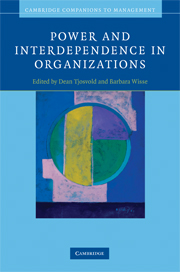Introduction
Published online by Cambridge University Press: 19 January 2010
Summary
The sole advantage of power is that you can do more good.
Baltasar Gracian, The Art of Worldly Wisdom, 1647Nearly all men can stand adversity, but if you want to test a man's character, give him power.
Abraham Lincoln (1809–1865)Power tends to corrupt, and absolute power corrupts absolutely.
Lord Acton, Letter to Bishop Mandell Creighton, 1898Power pervades everyday life in organizations and society and can be highly constructive but also very destructive. The powerful overcome adversities to unite and liberate countries; the powerful also suppress and demoralize. Power can mobilize us to rescue people from tragedies but also to bring havoc. Power helps us get things done that we cannot do alone, for good and for evil. It affects our dealing with crises but also our everyday activities. Power is inevitable in our organizations: the issue we confront is to understand when it is constructive and when it is destructive.
Power plays a key role in organizations and groups, indeed in all social contexts. Organizations – with their hierarchical structure, interdependent relationships, and the potential goal incompatibilities of the parties – are major arenas where power processes occur. Chapters in this book explore the positive and negative faces of power and interdependence in organizations; they identify opportunities and threats. Together the chapters advocate the need to manage power in order to take advantage of it and guard against its destructiveness.
The need to manage power crosses all boundaries; we need knowledge developed worldwide to help us manage power constructively.
- Type
- Chapter
- Information
- Power and Interdependence in Organizations , pp. 1 - 14Publisher: Cambridge University PressPrint publication year: 2009
References
- 1
- Cited by

